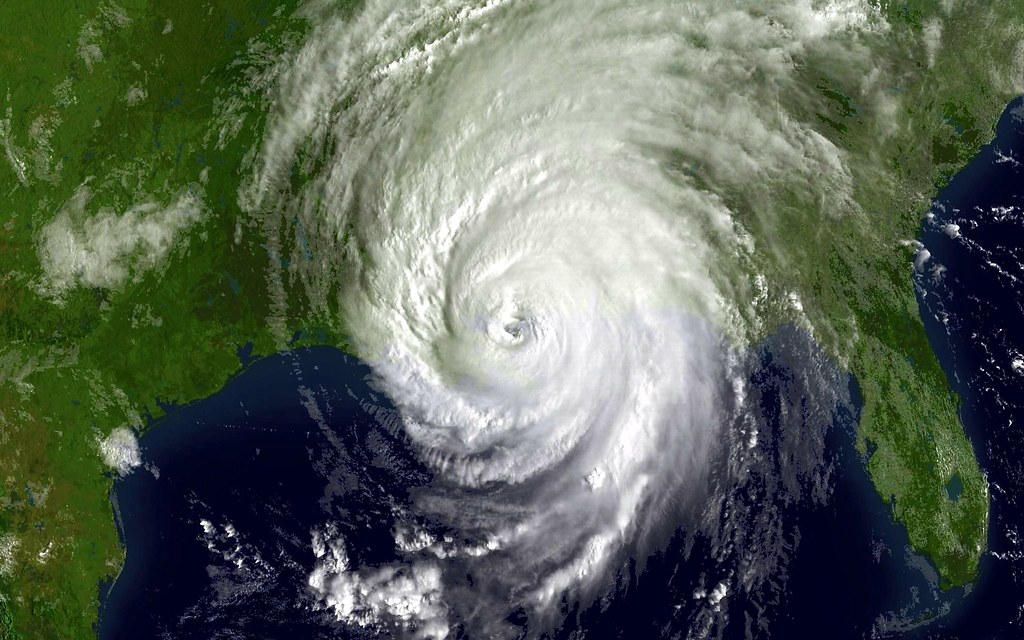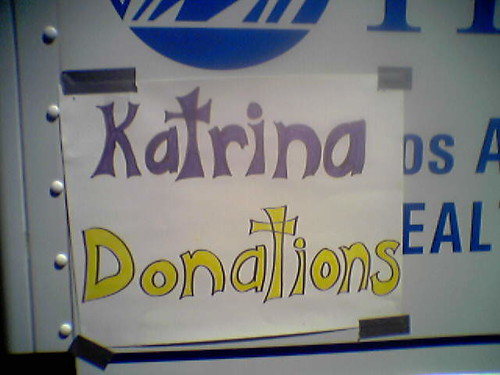
Satellite Image of Katrina
Photo by: NOAA
August 2005. Most people who live in Southeast Louisiana or on the Mississippi coast knows that date well. Residents prepared for yet another hurricane. Those privileged enough to evacuate prepared to leave much behind with the idea that they would be returning in a few days. Those days ended up being months as New Orleans faced one of the largest man-made disasters in the world and more importantly, one of the largest basic human rights crises in the country. It seemed like everyone wanted to help. Between corporations such as Hasbro donating money to families, and kids of Barnegat, New Jersey donating toys to children; everyone had some connection to New Orleans, and they needed to fulfill the human desire to make such a horrific story into something positive. Who wants to sit around and read stories about the permanent trauma of children and their neighborhoods that would never recover?
These children carried a burden that had never been seen before and researchers took note. One study performed looked at children in grades four through twelve in parishes that had been widely affected. Findings of this article demonstrated that three quarters of these children lost personal belongings, over half had still not returned to their pre-Katrina homes by 2007, and 40% of the children showed negative mental health effects. The article explicitly states that these children needed mental health services, but researchers failed to offer these. One participant in this study notes that it was jarring to remember that she was just a statistic in the perfect experimental population. The researchers never responded to her attempts to reach out and no follow up studies occurred.
Programs in the form of art therapy and other camps showed up in New Orleans but few were truly successful. I remember attending one of these programs at a church. It felt weird- awkward. It was like I knew exactly what they wanted– they wanted me to get upset; they wanted to be the ones to make me feel better. None of my friends wanted to open up to strangers. The adults encouraged us to write and draw about a time when we felt sad. We played games outside and got to ride in a nice bus for the day. Hurricane Katrina was never explicitly mentioned. As adults, it is easy to say that we would have mentioned Katrina if we really needed to talk about it. However, I don’t think we had the language, or the level of support needed to do so. While kids likely had a good time at these temporary camps- what does this do long term? What if the money spent on programs like these had been spent on actual long-term resources, such as therapy? Children who struggle with attachment are likely to latch on to any adult that shows interest in them. As a society many of us know that orphanage tourism is harmful, but how did this go on in our country without anyone taking notice? Programs in the form of camps popped up where parents were expected to pay. We know that Katrina disproportionately affected lower income students, and targeting traumatized parents living in poverty by using the trauma of their children should not be seen as a feel-good story. Trained professionals cannot establish the sense of community needed for children to heal in the span of a week. The programs that were enacted in schools were temporary and exclusive. Many were only offered to children who had behavioral issues or obvious internalizing issues. Parents and teachers had to recommend the child which allowed many students to be overlooked.

Poster for Katrina Donations
Photo by: Dale Leschnitzer
How can people with such good intentions actually be making things worse for the very group of people they are trying to help? It is in this failure to have an open mind — to think about the group of people and their norms — not just the norms of the communities of the helpers, that continued the traumatization of the children after Katrina. All children need help. Instead of flying to the next disaster, advocate for change. Donate money to legitimate mental health programs that provide therapy with professionals. Teachers need additional training that helps them make their classrooms a place where students can tell their stories and heal, provide money for these trainings. A study done in 2006 found that students distrust adults following disasters, but by creating classrooms filled with positivity and opportunities to write and discuss Katrina, students started to show signs of healing. By training teachers to recognize signs of PTSD, these students can enter treatment sooner.
While they should never be a replacement for therapy and trauma processing, programs such as Excite provide year-round support. After Hurricane Katrina, Excite was formed and provided opportunities through dance, journaling, and art for children to process their trauma. This is the level of consistency needed that someone traveling to a disaster ravaged community for a few months is unable to provide. Kids need routine and a sense of normalcy, they don’t need the newest hot toy, or a giant teddy bear.
New Orleans today continues to face a mental health crisis. As these kids are growing up with a lack of support and now the lack of funds to pay for their own mental health services, this problem is only going to get worse. The ten-year anniversary of Hurricane Katrina was in 2015 and coverage was unavoidable. These stories were positive, empowering narratives of recovery. For many people in New Orleans, seeing these stories everywhere brought back a lot of pain. There is a tendency to overlook the people who do not have heartwarming stories. To not listen to the people who do not want their pain to be exploited, they just want to the means to deal with their trauma and heal privately, away from the photo opportunities. While quietly donating money and leaving the rest up to professionals might not give you the ego boost, you can rest assured that you are legitimately helping.
 NOLAbeings
Multimedia artist Claire Bangser created NOLAbeings as a portrait-based story project that marries...
NOLAbeings
Multimedia artist Claire Bangser created NOLAbeings as a portrait-based story project that marries...
 Data corner: Adobe Suite (create a PDF, social media graphic, presentation, edit a photo and video
Data corner is where you go to work with analytics and top tech skills. It takes on everything from PERL and SQL to Canva and Sprout Social.
Data corner: Adobe Suite (create a PDF, social media graphic, presentation, edit a photo and video
Data corner is where you go to work with analytics and top tech skills. It takes on everything from PERL and SQL to Canva and Sprout Social.
